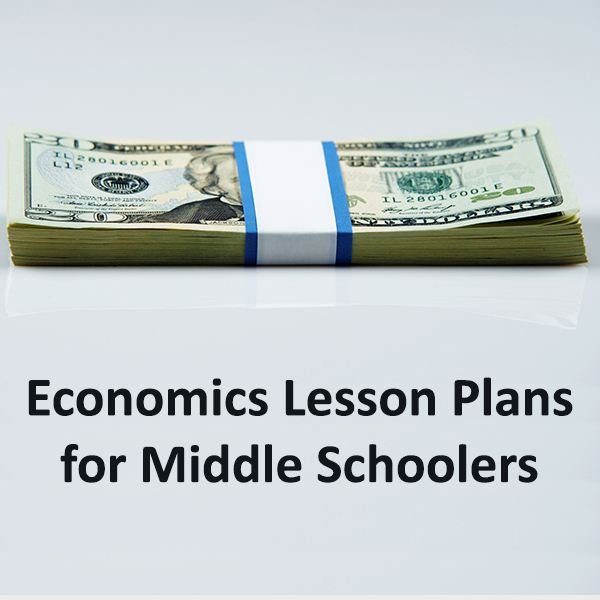Teaching Economics: A Guide to Middle School Lesson Plans and Related Activities
As adults, we are often confused or baffled by the ups and downs of the stock market or the economy. If understanding economics is so challenging for adults, imagine how confusing it can be for kids. However, it is important to give them a firm foundation in the basics of the economic model and help them understand common economic terms so that they are better prepared for handling their money when they are on their own.
In this collection of articles and activities, teachers will find ready to use lesson plans as well as lots of ideas for modifying the lesson to suit their needs. We have included related activities to extend the lessons and free quizzes, study guides and other support materials. Save yourself some time and hassle by referring to this handy guide whenever you need to prepare for a lesson on this subject.
We’ve placed these lessons in the middle school grouping; however, some of the lessons may be suitable for the high school level, as well as upper elementary, such as 5th grade.
10 Great Lessons
Here’s an excellent go-to lesson when you are starting at ground zero with your class and need to introduce them to the concept of economics. We’ve included a free list of some of the most commonly used economic terms, which you can use in class or send home as study guides. This can be a stand-alone lesson or easily combined with other lessons in this guide to create an economics unit.
Teaching The Concept of Resources
This is a great lesson plan to help students understand that resources can mean more than just the money in their pockets. In addition, while they may understand the concept of natural resources or cash money, do they really grasp the concept of capital or other types of resources? This is an easy to teach lesson that you can use as is or extend in a variety of ways.
Object lessons or hands-on activities are always good teaching tools because they engage students on so many different levels. After all, if you simply ask your students to define scarcity, they may or may not be able to do so, and even if they can define it, that doesn’t mean that they really understand it. However, when they are confronted by a lack of resources, they not only get the concept, but they may discover that they don’t like it.
In this lesson, you will be teaching your students how to take the scientific method and apply it to economics. If you haven’t already covered the scientific method, this is a wonderful hands-on exercise to introduce it. A plus here is the free economic model worksheet, which saves you the time of having to create one yourself.
Turn to this lesson plan when you need a way to review and to assess your students’ understanding of economics. It includes a free economics quiz and a review activity. Use it as a standalone activity or combine it with one of the lessons above to create an easy unit study on economics.
If time permits, this is an awesome lesson to combine with the one on stock market investments. After all, market bubbles and crashes are a fact of everyday life, and students need to understand the risks and rewards of playing the market. This lesson includes a fun class project that explores four great stock market disasters.
Understanding the Financial Crisis – Economic Terms
This lesson plan is designed for high schoolers and middle schoolers. They will learn the definitions of important economic terms such as the prime rate or real income. The beauty of this lesson is you can use it to introduce these terms to students, use it as a study guide or incorporate it with other economics lesson plans as an extension resource.
Ponzi Schemes: A Fun Lesson Plan That Doubles as an April Fool’s Day Activity
Although this is designed to be used as an April Fool’s Day activity, you can actually use it at any time of year. You’ll start by explaining to students how the term “Ponzi scheme” originated and where it got its name. Then, you’ll complete a fun class project to illustrate the concept of the Ponzi scheme.
Do You Need It or Do You Want It? An Economics Lesson
You may want a new Kindle Fire (or other high tech gadget), but do you really need it? These are the types of questions that consumers must answer each day as they decide how to balance their income with their outgo. In this class project, your students will get real world experience with working within a set budget to juggle their needs versus their wants versus their salary. Although this is designed as a class activity, you could modify it for small groups or individual projects very easily.
The Fundamentals of Writing Checks
As an adult, you understand why it is important to write checks in ink rather than pencil, but your students do not…until you teach them why! This is a fun lesson plan for middle schoolers to help them learn the proper way to write checks. You can use the lesson as presented here or modify for your specific class and as a nice bonus, we’ve included some free graphic examples of checks that have been written correctly.
Share Your Thoughts
Did you find this guide to economics lesson plans helpful? We encourage our readers to leave us feedback in the comments section below because it helps us fine tune our product to offer you the best reading experience. Please let us know how we did!
References
- Image: http://www.sxc.hu/photo/676080 by SheCat under royalty free license
